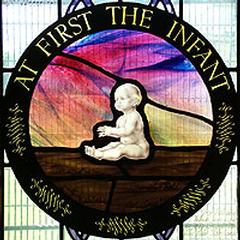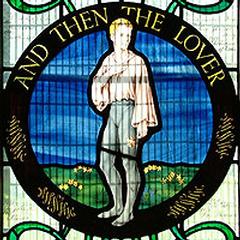Seven Ages of Man
Instrumentation countertenor or bass [with soprano & tenor alternatives], flute, oboe, clarinet, bassoon, French horn [i.e. wind quintet], trumpet & trombone. Score, download - 0.08MB |
Other Information
The Seven Ages of Man is a solo chamber cantata for countertenor or bass [with soprano & tenor alternatives], flute, oboe, clarinet, bassoon, trumpet, French horn & trombone. It was written as part of David Fisher´s Master of Music portfolio in December 1987 and January 1988 and orginally conceived as a vehicle for the superb countertenor, Philip Manser who sang the first performance of Fisher´s Ave Regina caelorum and subsequently recorded it with Lincoln Cathedral Choir. The range of the countertenor part is over two and a half octaves from the C below middle C although there are alternatives for bass, tenor and soprano and each voice can substitute any of those notes for the given ones.
The work is based on a falling seven-note theme and its inversion first heard in the Prologue as a clarinet cadenza – see left and the score which can be downloaded. The clarinet solo also contains a scale based on the theme and its inversion which is an important feature in linking the seven ages. A sprechsgesang section follows the clarinet solo and each of the following seven sections are preceded by percussive chords and scales [using all the seven notes] which become more complex in instrumentation, phrasing and rhythm to suit the following ‘age’. The infant: A lullaby with a duet between flute and clarinet, based on seventh, accompanied by a gentle chorale melody in the brass. The schoolboy: A skipping motif in the trombone. The lover: A sighing motif with a descriptive clarinet solo. The soldier: A march in seven with fanfare-like figures in the trumpet. The justice: A more pompous march with a prominent horn solo in the trio. The pantaloon: This recalls all the main themes in order whilst the voice sings the words in steadily increasing intervals. Second childhood: Based on ‘the infant’ though a seventh removed in pitch. Here the lullaby motif is now in three parts. The voice descends to the low ‘C’ with which it began. The Epilogue is based on the opening clarinet cadenza in the prologue with vocal and instrumental interruptions before the final statement of the seven-note theme on all the instruments.
"All the world´s a stage, And all the men and women merely players; They have their exits and their entrances; And one man in his time plays many parts, His acts being seven ages. At first the infant, Mewling and puking in the nurse´s arms; Then the whining school-boy, with his satchel And shining morning face, creeping like snail Unwillingly to school. And then the lover, Sighing like furnace, with a woeful ballad Made to his mistress´ eyebrow. Then a soldier, Full of strange oaths, and bearded like the pard, Jealous in honour, sudden and quick in quarrel, Seeking the bubble reputation Even in the cannon´s mouth. And then the justice, In fair round belly with good capon lin´d, With eyes severe and beard of formal cut, Full of wise saws and modern instances; And so he plays his part. The sixth age shifts Into the lean and slipper´d pantaloon, With spectacles on nose and pouch on side; His youthful hose, well sav´d, a world too wide For his shrunk shank; and his big manly voice, Turning again toward childish treble, pipes And whistles in his sound. Last scene of all, That ends this strange eventful history, Is second childishness and mere oblivion; Sans teeth, sans eyes, sans taste, sans everything." William Shakespeare - As You Like It Jaques (Act II, Scene VII, lines 139-166)
|




